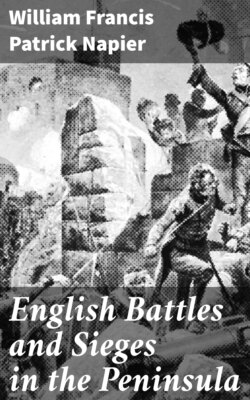Читать книгу English Battles and Sieges in the Peninsula - William Francis Patrick Napier - Страница 23
На сайте Литреса книга снята с продажи.
Combat of Redinha. (March, 1811.)
ОглавлениеTable of Contents
The light division under Sir William Erskine soon won the wooded slopes covering Ney’s right, and the skirmishers pushed into the open plain, but were there checked by a heavy rolling fire, and a squadron of hussars, charging, took fourteen prisoners. Erskine then formed his line, which, outflanking the French right, was reinforced with two regiments of dragoons. Picton had also seized the wood covering the French left, and Ney’s position was laid bare; but he, observing that Wellington, deceived by the reserve beyond the bridge, was bringing all the allied troops into line, would not retire; he even charged Picton’s skirmishers and held his ground, though the third division was nearer to the bridge than his right, and there were troops and guns enough on the plain to overwhelm him. In this posture both sides remained an hour, but then three cannon-shots fired from the British centre, gave the signal for a splendid spectacle of war. The woods seemed alive with troops, and suddenly thirty thousand men, presenting three gorgeous lines of battle, were stretched across the plain, bending on a gentle curve and moving majestically onwards, while horsemen and guns, springing simultaneously from the centre and left, charged under a general volley from the French battalions, who were thus covered with smoke, and when that cleared away none were to be seen! Ney, keenly watching the progress of this grand formation, had opposed Picton’s skirmishers with his left, while he withdrew the rest of his people so rapidly as to gain the village before even the cavalry could touch him, the utmost efforts of the light troops and horse-artillery only enabling them to gall the hindmost with fire.
One howitzer was dismounted, but the village of Redinha was in flames between it and the pursuers, and Ney in person carried off the injured piece; yet with a loss of fifteen or twenty men and great danger to himself; for the British guns were thundering on his rear, and the light troops, chasing like heated bloodhounds, almost passed the river with his men; his reserve beyond the bridge then opened a cannonade, but fresh dispositions soon made it fall back ten miles. Twelve officers and two hundred men were killed and wounded in this combat. Ney lost as many, but he might have been destroyed, Wellington paid him too much respect.
Condeixa, where the French now took position, commanded two roads, one behind their right leading to Coimbra; the other on their left, leading to the Sierra de Murcella. The first offered the Mondego as a permanent line of defence, with the power of seizing Oporto by a detachment. The second presented only a rugged narrow line of retreat up the left bank of the Mondego, and involved the evacuation of Portugal; for that river was not fordable at the season and the Portuguese militia were in force on the other side. Massena first detached Montbrun to ascertain the state of Coimbra, which was really defenceless, yet Trant with a few militia-men made such show of resistance that it was reported inattackable; whereupon the French prince set fire to Condeixa and adopted the position of Cazal Nova on the Murcella road: not however without a skirmish in which he narrowly escaped capture.
No orders were given in the night to attack, nevertheless, next morning, although an impenetrable mist covered the French position and the dull sound of a stirring multitude came from its depths, Sir W. Erskine, with astounding indifference, and against the opinion of all the officers about him, ordered the 52nd Regiment to plunge in column of sections, without even an advanced guard, into the sea of fog below him. The road dipped suddenly and the regiment was instantly lost in the mist, which was so thick that, the troops, unconsciously passing the enemy’s out-posts, nearly captured Ney, who slept with his pickets. The rest of the division was about to descend into the same gulf, when the rattling of musketry and the booming of round shot were heard, the vapour rose slowly, and the 52nd was seen on the slopes of the opposite mountain, closely engaged in the midst of an army!
